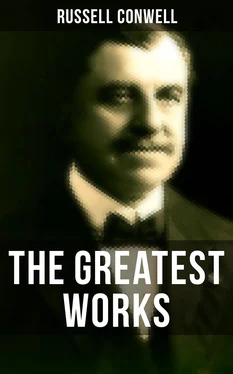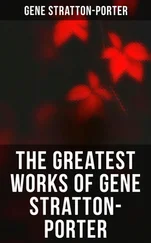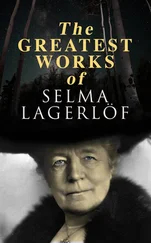The time has come when a horse may be as useful as a university.
At Yale University, one day, I heard a professor of science tell those boys that a horse has within its body so much galvanic or electric force continually generated by the activities of life, that if that electricity could be concentrated and held to a certain point, a horse could stand still and run a forty-horse power electric engine. He went further than that and said that a man has within his living body sufficient continually generated electricity which, if it were brought to a point, might enable him to stand still and run a ten-horsepower electric engine. I went out of that class-room with a sense of triumph, thinking:
"There is going to be use, after all, for the loafers who stand on the corners and smoke!"
In Europe, some years ago, a sewing-machine was invented on which a lady put her bare feet, and her electric forces started the machine. This power does not yet run the machine strong enough to force the needle for real sewing. The only question is to get more of the electricity of that lady through the machine and secure the greater power. Then if a young man wants a valuable wife he must marry one "full of lightning."
The time is very near at hand when all the motive power of the world may be furnished by animal life. When they get one step further the greatest airships will go up and take with them a lap dog. The airship will require no coal, no oil, but just the electric force of that lap dog; and if they carry up enough to feed that dog he will furnish the power to run the motors. The great high seas of the air will be filled with machines run by lap dogs or the electricity of the aviator himself. It is not so far away as many of you may suppose, and it is the greatly needed improvement of this time, not so much for the purpose of the war, as for peace.
The time has come when an old hen may become a great instructor of the world. I would rather send my child to an old hen than to any professor I ever saw in my life. That old biddy which scratches around your door, or who cackles beside your fence, or picks off your flowers, knows more of some things than any scientific professor on the face of the earth. I wish I knew what that old hen does. But there are some professors who pretend to have a wonderful intellect, who say:
"I graduated from Leipsic or from Oxford or Harvard, and I have no time to observe a hen."
No time to notice a hen? My friend, did you ever try to talk with her?
"No, I did not; she has no language."
Didn't you ever hear her call the chickens and see them come? Didn't you ever hear her scold the rooster, and see him go? Well, a hen does have a real language, and it is time you scientific professors understood what that old biddy says.
"Oh, but," says the professor, "I have no time to spend with a hen! They are around the place all the time, but I never take any special notice of them. I am studying the greater things in the world."
"Won't you come into my study a minute, professor, and let me examine you? You have examined the boys long enough, now let me examine you.
"Bring all you know of science and all the scientific applications ever made, and all the instruments that are ever used, bring all that the world has ever discovered of chemistry. Come, and take in your hand a dove's egg, just the egg. Now, professor, will you tell the person who is reading this book where, in this egg, is now the beating heart of the future bird? Can you tell where it is?"
"Oh no, I cannot tell that. I can tell you the chemistry of the egg."
"No, I am not looking for that. I am looking for the design in the egg. I am looking for something more divinely mysterious than anything of chemistry. Now, professor, will you tell me where in that egg is the bony frame that next will appear?"
"No, I cannot tell you that."
"Where is the sheening bosom, and where the wings that shall welcome the sun in its coming?"
"No man can tell that," says the professor.
The professor is quite right. It cannot yet be told. Yet, in that egg is the greatest scientific problem with which the world has ever grappled—the beginning of life and the God-given design. In that egg is the secret of life. Professor, tell me where this life begins. The professor says, "No man can answer questions like that."
Then, until we can answer, we must take off our hats every time we meet a setting hen. For that old biddy knows by instinct more about it than any one of us. She knows directly, through her instinctive nature from God, something about the beginnings of life that we cannot understand yet.
The last time I saw Dr. Oliver Wendell Holmes, the grand poet of Massachusetts, he asked me to go out in his back yard and see his chickens. He told me they would answer to their names. But it turned out that they were like our children, and would not show off before company. But I haven't any doubt those little chickens still with the hen did answer to their individual names when she alone called them. I am sure that great man understood the hen and chickens as fully as Darwin did the doves.
It was a wonderful thing for science that men like Holmes and Darwin could learn so much from the hen. It reminds me of a current event in Doctor Holmes's own life, though the biographies do not seem to have taken notice of it. He and Mr. Longfellow were very intimate friends. They were ever joking each other like two boys, always at play whenever they met. One day, it is said, Doctor Holmes asked Mr. Longfellow to go down to Bridgewater, in Massachusetts, to a poultry show. He went; he was greatly interested in chickens.
Those two great poets went down to the poultry show, and as they walked up the middle passageway between the exhibits of hens and chickens they came to a large poster on which was a picture of a rooster. He had his wings spread and mouth open, making a speech to a lot of little chickens. It was such a unique picture that Mr. Longfellow called Doctor Holmes's attention to it, and said:
"There, you love chickens, you understand them. What do you suppose a rooster does say when he makes a speech to chickens like that?"
They went on, and Doctor Holmes was studying over it. Finally he turned around and said, "Go on, I will catch up with you." He went back to that poster, got up on a chair, took the tacks out of the top, turned in the advertisement at the top, above the picture, and then took his pencil and drew a line from the bill of the rooster that was making that speech up to the top. There he wrote what he thought that rooster was saying to those chickens. They say that he did not make a single correction in it, of line or word. He then went after Mr. Longfellow and brought the great poet back to see the poster. He had written these words, in imitation of Longfellow's "Psalm of Life":
Life is real, life is earnest!
And the shell is not its pen;
Egg thou art, and egg remainest,
Was not spoken of the hen,
Art is long, and Time is fleeting,
Be our bills then sharpened well,
And not like muffled drums be beating,
On the inside of the shell.
In the world's broad field of battle,
In the great barnyard of life,
Be not like those lazy cattle!
Be a rooster in the strife!
Lives of roosters all remind us,
We can make our lives sublime,
And when roasted, leave behind us
Hen tracks on the sands of time.
Hen tracks that perhaps another
Chicken drooping in the rain,
Some forlorn and hen-pecked brother,
When he sees, shall crow again.
Animal life can do much for us if we will but study it, take notice of it daily in our homes, in the streets, wherever we are.
Chapter III. Mastering Natural Forces
Table of Contents
It has been demonstrated by science that the mentality and disposition of all kinds of animal life are greatly affected by what they eat. Professor Virchow, of Germany, took two little kittens and fed them on different foods, but kept them in the same environment. After three months he went in and put out his finger at one of those little kittens, and it stuck up its back and spit and scratched and drew the blood. It was savage. He put out his finger to the other kitten, fed on the other food, and it rubbed against his finger and purred with all the loveliness of domestic peace. What was the difference between the kittens? Nothing in the world but what they ate.
Читать дальше












